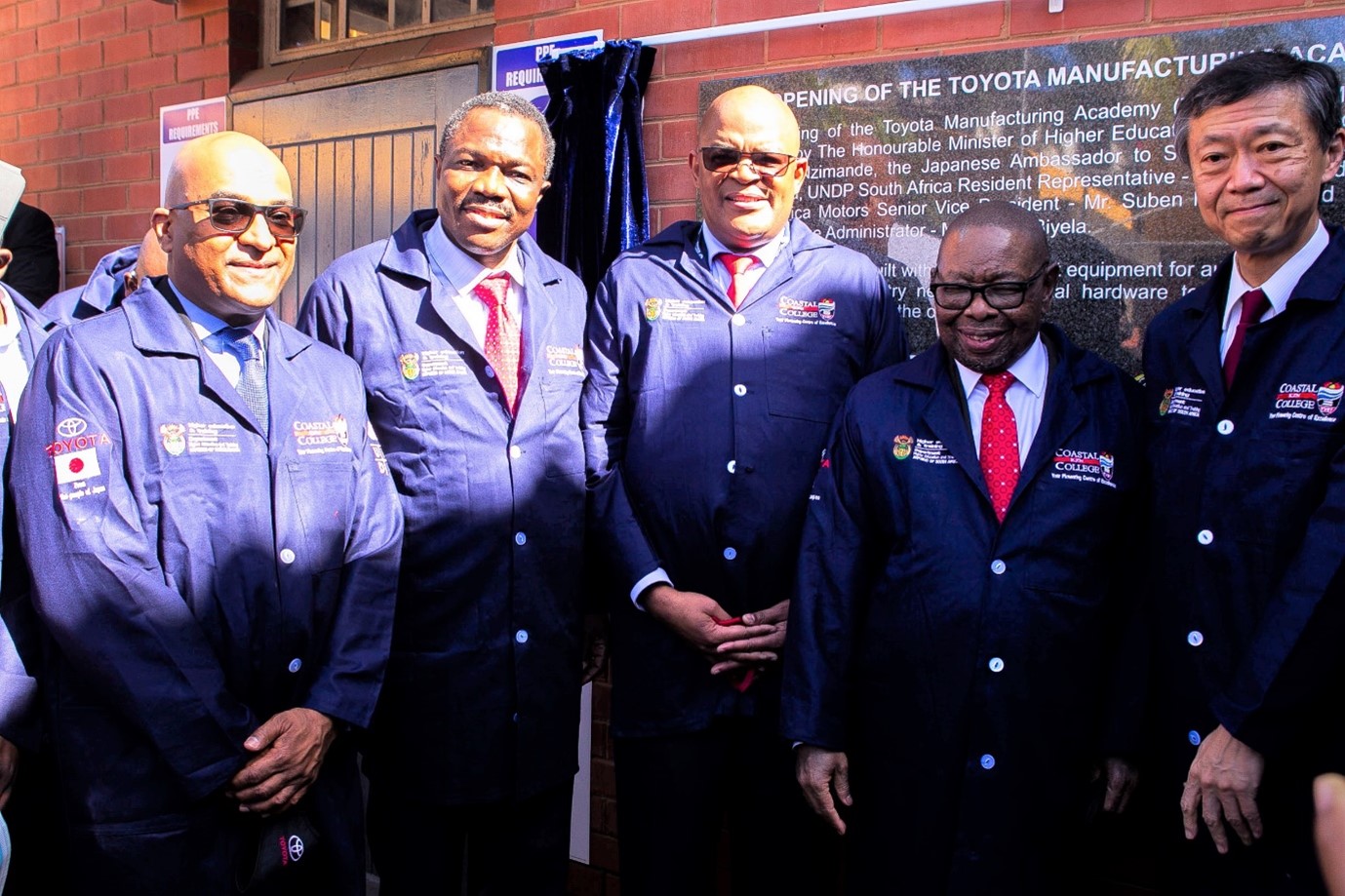Japan, South Africa, UNDP, and Toyota SA Launch Automotive Project to Advance Youth Development
June 24, 2022

From Left: Mr. Suben Moodley, Toyota South Africa Motors Senior Vice President; Dr. Ayodele Odusola, UNDP South Africa Resident Representative; Mr. Ndoda Biyela, Coastal KZN TVET College Administrator; Hon. Dr. Blade Nzimande, Minister of Higher Education, Science, and Innovation; and H.E. Mr. Norio Maruyama, Ambassador of Japan to South Africa.
The Governments of Japan and South Africa, together with UNDP South Africa, in May officially launched the Automative Training and Re-skilling in the Post-COVID Economic Recovery for Vulnerable Youth and Women in South Africa Project at the Coastal Kwa-Zulu Natal (KZN) Technical and Vocational Education and Training (TVET) College.
In support of this initiative and aligned to Toyota South Africa Motors’ (TSAM) youth empowerment programmes,TSAM signed a memorandum of understanding with UNDP in December 2021, which culminated in the official opening of the Toyota Manufacturing Academy (TMA) at the Swinton Campus of the Coastal KZN TVET College. TSAM established the TMA to broaden and strengthen its training capacity and work toward further empowering youth to become future leaders in a ‘re-industrialised’ South Africa.
The project commenced in March 2021 and implemented a series of initiatives contributing to South Africa’s post-COVID-19 economic recovery by targeting the automotive sector. These initiatives included various trainings and activities on skills development and the provision of automotive workshop equipment to strengthen the capacity of youth and TVET colleges that aligns with the post-COVID-19 economy and labour market needs.
In addition to benefiting the Coastal KZN College broadly, this tripartite cooperation has benefited the TMA, specifically, by supporting 24 young people through the provision of mechanical, electronic, electrical workshop and ICT equipment.
The collaboration has supported the Presidential Youth Employment Initiative through promoting the SAYouth platform, where 11,500 students signed up to be linked to opportunities and 530 found employment and income-generating activities to date. The project has also supported the development of an online automotive career platform Yakh'ifuture, that helps TVET college students explore and plan their careers in the industry, practice with tools and technologies, and develop new skills for their success. Additionally, 64 young people (26 women) have been trained on manufacturing operator skills, work readiness, gender equality, and social inclusion.
Tshwane South and Northlink TVET Colleges have both received digital learning equipment, including laptops, interactive whiteboards, projectors, and digital content for ‘soft skills’ development. Twenty-four lecturers from all the colleges have been trained on blended teaching techniques. An additional 30 lecturers will further benefit from training on the latest technologies and top-up skills required in the automotive industry, along with partnership development in the field.
In his speech at the project launch, Hon. Dr. Blade Nzimande, Minister of Higher Education, Science, and Innovation, said, “I have always advocated for an increased partnership between our TVET Colleges and the industry as we continuously enhance our curriculum to respond to the needs of the industry.” He noted that the Department of Higher Education and Training embarked on a campaign to launch 26 Centres of Specialisation in 19 TVET colleges, prioritising 13 occupational trades in high demand, with the aim of curbing the shortage of trade skills while reducing unemployment and poverty in South Africa
Dr. Ayodele Odusola, UNDP Resident Representative - South Africa, emphasized that the achievements of the project reflect the power of strategic partnerships in revitalizing TVET colleges and laying the foundation for the automotive skills required of the 21st century and post-COVID recovery. “Youth development is key to addressing the triple development challenges of poverty, inequality, and unemployment. Honing their skills and unlocking their untapped talent not only promotes inclusive and sustainable economic development, but also has a transformational impact on society. We are very proud of many achievements in youth development that the project has made in such a short period through the multi-stakeholder partnerships,” he added.
H.E. Mr. Norio Maruyama, Ambassador of Japan to South Africa, remarked, “I recognize that TMA is the master class training for TVET and a totally new concept of international cooperation. TSAM is committed not only to training students, but to also be responsible for their future careers. The project outcome is very visible, it actually creates jobs! This year, we are going to hold the 8th Tokyo International Conference on African Development (TICAD8) in Tunisia. I am convinced that TMA is one of the major achievements of TICAD, which was achieved through the cooperation of the Japanese government, international organizations and private companies. I would like to showcase TMA as [a form of] best practice and enlarge its success to broader Africa with UNDP as a co-sponsor of TICAD.”
Mr. Suben Moodley, TSAM Senior Vice President, noted the increasing demand for complex skills set, and the potential to create new jobs in the automotive industry. “Traditional markets are being redefined as new types of vehicles are introduced, ranging from hybrid to plug-in hybrid, battery electric to fuel cell electric vehicles, with a wide range of driver assistance systems that requires digitisation and smart factory systems, along with the skills set to support them. Equally important, soft skills such as resilience, flexibility, problem solving, and creativity will be highly valued. So, the challenge is not just technical skills but a combination of soft and technical skills,” he stressed.
With the right skills and the transformation of TVET colleges, South Africa can meaningfully address the triple development challenges of poverty, inequality, and unemployment. Such dynamic initiatives ultimately require strong partnerships. To this end, UNDP South Africa will continue to work with the Governments of Japan and South Africa and the TSAM to further advance youth development and TVET colleges’ transformation.

 Locations
Locations

